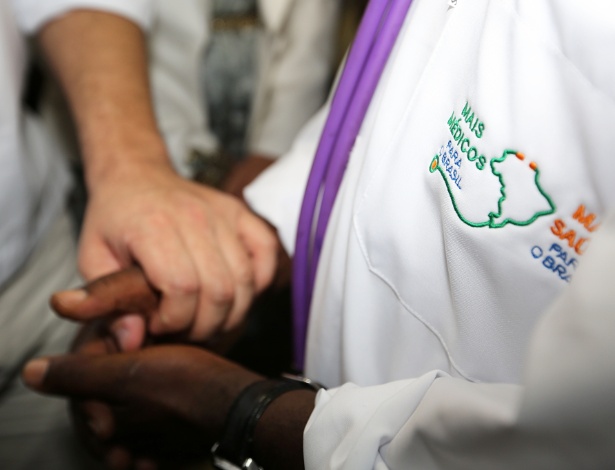Image courtesy of Karina Zambrana/ASCOM
This week, the Brazilian healthcare program More Doctors (in Portuguese, “Mais Médicos”) suffered a severe blow as Cuba announced it would no longer participate. Launched by the government of former president Dilma Rousseff, More Doctors is a program created to improve access to healthcare in the public health system, by placing physicians in regions where there was a shortage or absence of these professionals. It also includes a plan to invest in the construction, remodeling and expansion of Basic Health Units, as well as to admit more students to medical schools and residency. The program is particularly known for relying heavily on a partnership between the governments of Brazil and Cuba. In short, it allows doctors from Cuba to practice medicine in Brazil under tailor-made—and less restrictive—labor regulation, in order to advance the goal of increasing access to healthcare in poor and remote parts of the country.
In justifying its decision to withdraw from More Doctors, the Cuban government cited “contemptuous and threatening” comments directed at the Cuban physicians by the president-elect of Brazil, Jair Bolsonaro, among which his questioning of their qualifications. Bolsonaro responded by saying that Cuba withheld most of the compensation earned by the Cuban doctors and did not authorize them to bring their families along, a policy he defined as exploitative. These are old points of tension. More Doctors has been controversial since its beginning, five years ago. Upon the arrival of the first Cuban physicians, there were protests among the medical community and criticism towards the fact that they did not have to take the usual exam to validate a foreign degree in Brazil. Lately, critics have also embraced the human rights discourse in regard to the Cuban doctors.
Despite controversies, the program More Doctors has had good results throughout the years. It filled tens of thousands of jobs in more than 4,000 Brazilian municipalities and 34 Special Indigenous Sanitary Districts. Data from the Brazilian Ministry of Health shows that, after implementing the program, 700  municipalities located in remote areas of Brazil had, for the first time in history, a doctor residing there for basic care. Multiple institutions conducted studies about More Doctors, generally obtaining positive reviews. The program even gained international attention, being considered an example of good practices by the United Nations Office for South-South Cooperation and the United Nations Developed Program. These and other results are available at the Pan-American Health Organization website, last updated in May 2018.
municipalities located in remote areas of Brazil had, for the first time in history, a doctor residing there for basic care. Multiple institutions conducted studies about More Doctors, generally obtaining positive reviews. The program even gained international attention, being considered an example of good practices by the United Nations Office for South-South Cooperation and the United Nations Developed Program. These and other results are available at the Pan-American Health Organization website, last updated in May 2018.
In fact, the Pan-American Health Organization was an important part of the institutional backbone of More Doctors, being the oldest international public health organization in the world. It played a key role in mediating the agreement between Brazil and Cuba and offering technical support throughout its implementation. For instance, the organization’s office in Brazil provided logistical and administrative support for the training of the doctors, monitoring and evaluation, as well as for the compilation and dissemination of lessons learned to countries in the region.
Putting aside political considerations, the program More Doctors touches upon important issues related to health governance, such as the regionalization of health policies in a coordinated way (one of the organizational principles of the Brazilian public health system) and the difficulties that arise when there are overlapping attributions and consequent inaction. More Doctors also raises issues of human rights, and of course there is room to question Cuba’s policies towards their citizens participating in the program.
However, it is also important to stress that health is itself a human right, enshrined not only in the Constitution of Brazil but also in international treaties ratified by this country. In this sense, the federal government deserves praise for at least attempting to fill the gaps in healthcare. If not through More Doctors, Brazil should be thinking of other innovative ways to make progress in the realization of the right to health.



